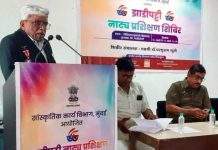Prof. Dr. Ravindra Ambade
Lumpy Skin Disease is a new outbreak in animal health in Maharashtra. In the dairy sector, India accounts for 33% of the world’s milk production, which ranks first in the world. But at present, it has been eclipsed by the deadly infectious Lumpi Skin Disease, which is increasing in cattle in almost all states of India.
While raising and managing domestic animals by the farmers, it is essential to vaccinate animals instead of panicking about Lumpy Skin Disease (LSD). In the state of Maharashtra, the incidence of Lumpi Skin Disease is increasing in the districts of Thane, Raigad Ratngagiri, Nashik, Dhule and Jalgaon. So far, more than 50 thousand cattle have died in the country and the production of milk has also decreased significantly.
As Navratri is currently underway and Diwali festival is ahead, the milk industry is likely to be hit hard by this disease due to the decreased milk production and consumption. Lumpi Skin Disease is caused by a capripox group of viruses, which was first discovered in Zambia in 1929.
“The main symptom of this disease is the appearance of two-to-five-centimetre painful nodules or lumps on the skin of sick animals. These nodules often extend deep into the meatus. They mainly appear on the head, neck, limbs, udders, and near the udder. These nodules may turn into ulcers after a few days and eventually develop scabs on the skin. In such cases, if sick animals are not treated by a veterinarian immediately, the animal may die. besides fever, loss of milk production, loss of appetite, swelling of the external lymph glands, watery nose and watery eyes, and infertility and abortion may also occur in affected animals”.
There are rumours on social media that humans are contaminated by eating meat of goat-sheep and chicken. There is no truth in this report, actually Lumpy Skin Disease is a virus disease of cattle only and it does not occur at all by consumption of goats, sheep and chickens’ meats. Lumpy skin disease is not communicable to human being even by drinking animal’s milk. Specially, Lumpi disease viruses are inactivated by temperature of 70 to 75 degree for 1 -3 minutes. Therefore, germs do not survive in boiled and pasteurized milk in bags. So, milk should be drunk by proper boiling and animals’ meat should be cooked properly before consumption.

In the preventive measures and care of LSD, infected animals should be separated from other animals because contact with infected animals can spread the disease to other animals. It is necessary that cattle shed should be regularly disinfected using 1% formalin or 3% sodium hypochlorite or phenol and vaccinate the animals. Antiseptic ointment should also be applied on scabs.
(The author is Assistant Professor, Department of Veterinary Biochemistry, Mumbai Veterinary college, Mumbai.)









